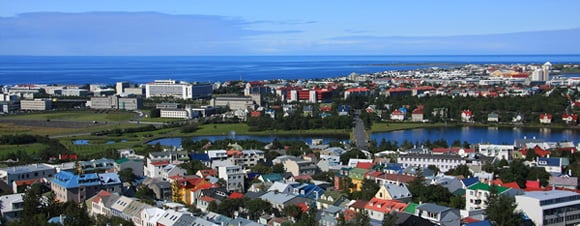15 Expats Talk about Health Insurance and Healthcare in Iceland
Last updated on Jan 06, 2024
Summary: The quality of medical care in Iceland is generally considered to be very high, with a strong emphasis on preventative care. Iceland has a universal healthcare system, which provides free or low-cost access to medical services for all citizens. In comparison to the US, Iceland has a much lower rate of infant mortality and a longer life expectancy. Emergency services in Iceland are well-developed and reliable. Ambulance services are available 24 hours a day, and can be called by dialing 112. Emergency medical personnel are highly trained and equipped with the latest medical technology.

How are healthcare services Iceland?
When we asked expats and global nomads about the quality of medical care in Iceland, they replied:
"Healthcare services in Iceland are provided by the public healthcare system, which is funded by the government and managed by the Icelandic Directorate of Health. The public healthcare system provides a wide range of services, including primary care, hospital care, mental health services, and preventive health services. The quality of public healthcare in Iceland is generally high, with a focus on preventive care and access to specialist services. Foreign residents in Iceland have access to the public healthcare system, although they may need to pay a fee for some services. Expats in Iceland can use the public healthcare system by registering with the Icelandic Directorate of Health and paying a fee for services," said one expat.
What are medical services in Iceland like?
Please login to continue reading this article.
Not a member? Join Today (it's free).

Traveling Mailbox serves thousands of travelers, expats, digital nomads, businesses, individuals and others in over 47 Countries by scanning their postal mail so they can view it online anywhere in the world. They provide customer service 7 days a week so if you need assistance, it is just a phone call away. Traveling Mailbox works with Evernote, Bill.com and Dropbox. And, there are Traveling Mailbox apps available for iOS and Android devices.
Click connect to have our partner contact you via e-mail and/or phone.

Traveling Mailbox serves thousands of travelers, expats, digital nomads, businesses, individuals and others in over 47 Countries by scanning their postal mail so they can view it online anywhere in the world. They provide customer service 7 days a week so if you need assistance, it is just a phone call away. Traveling Mailbox works with Evernote, Bill.com and Dropbox. And, there are Traveling Mailbox apps available for iOS and Android devices.
Click connect to have our partner contact you via e-mail and/or phone.
 Traveling Mailbox
Traveling MailboxConnect
Traveling Mailbox serves thousands of travelers, expats, digital nomads, businesses, individuals and others in over 47 Countries by scanning their postal mail so they can view it online anywhere in the world. They provide customer service 7 days a week so if you need assistance, it is just a phone call away. Traveling Mailbox works with Evernote, Bill.com and Dropbox. And, there are Traveling Mailbox apps available for iOS and Android devices.
Click connect to have our partner contact you via e-mail and/or phone.
 Traveling Mailbox
Traveling MailboxTraveling Mailbox serves thousands of travelers, expats, digital nomads, businesses, individuals and others in over 47 Countries by scanning their postal mail so they can view it online anywhere in the world. They provide customer service 7 days a week so if you need assistance, it is just a phone call away. Traveling Mailbox works with Evernote, Bill.com and Dropbox. And, there are Traveling Mailbox apps available for iOS and Android devices.
Connect
Click connect to have our partner contact you via e-mail and/or phone.

Traveling Mailbox serves thousands of travelers, expats, digital nomads, businesses, individuals and others in over 47 Countries by scanning their postal mail so they can view it online anywhere in the world. They provide customer service 7 days a week so if you need assistance, it is just a phone call away. Traveling Mailbox works with Evernote, Bill.com and Dropbox. And, there are Traveling Mailbox apps available for iOS and Android devices.
Click connect to have our partner contact you via e-mail and/or phone.

Traveling Mailbox serves thousands of travelers, expats, digital nomads, businesses, individuals and others in over 47 Countries by scanning their postal mail so they can view it online anywhere in the world. They provide customer service 7 days a week so if you need assistance, it is just a phone call away. Traveling Mailbox works with Evernote, Bill.com and Dropbox. And, there are Traveling Mailbox apps available for iOS and Android devices.
Click connect to have our partner contact you via e-mail and/or phone.
About the Author
 Joshua Wood, LPC joined Expat Exchange in 2000 and serves as one of its Co-Presidents. He is also one of the Founders of Digital Nomad Exchange. Prior to Expat Exchange, Joshua worked for NBC Cable (MSNBC and CNBC
Primetime). Joshua has a BA from Syracuse and a Master's in Clinical and Counseling Psychology from Fairleigh Dickinson University. Mr. Wood is also a licensed counselor and psychotherapist.
Joshua Wood, LPC joined Expat Exchange in 2000 and serves as one of its Co-Presidents. He is also one of the Founders of Digital Nomad Exchange. Prior to Expat Exchange, Joshua worked for NBC Cable (MSNBC and CNBC
Primetime). Joshua has a BA from Syracuse and a Master's in Clinical and Counseling Psychology from Fairleigh Dickinson University. Mr. Wood is also a licensed counselor and psychotherapist.
Some of Joshua's articles include Pros and Cons of Living in Portugal, 10 Best Places to Live in Ireland and Pros and Cons of Living in Uruguay. Connect with Joshua on LinkedIn.
Other Questions:
- How do I meet people in Iceland?
- What is life like as an expat in your area?
- Is there a lot of crime in Iceland?
- What do I need to know before retiring in Iceland?
- Is there a lot of diversity? Are people in Iceland accepting of differences?
- What are the schools in Iceland like?
- Is the cost of living in Iceland high?
- What advice do you have for expats having a baby in Iceland?
- What are healthcare services like in Iceland?
- Is the cost of living in Iceland high?
- What type of recreational facilities are in Iceland?
- What is the weather like in Iceland?
- Are there good restaurants in Iceland?
- Where will I buy groceries and do other shopping in Iceland?
- What are the visa & residency requirements in Iceland?
- Are healthcare and health insurance expensive in Iceland?
- What do I need to know when buying property in Iceland?
- Are foreigners allowed to own property in Iceland?
- What appliances are typically included in a rental?

 Iceland
Iceland
